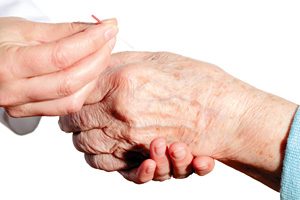We have treated many elderly patients here at Acuhealth and often hear stories of how they are sitting at home feeling stupefied by the cornucopia of medications they are taking. It is so sad that some of our older generation, of whom many have gone through some harrowing times in their lives, are sometimes overlooked by the younger generations. However, it is also uplifting to see those with amazing carers in their lives.
We are pleased to see the smiles on the faces of our elderly patients after treatments for ailments such as pain caused by arthritis, respiratory or digestive issues, and also to brighten their mental and emotional outlook. To prove the effectiveness of acupuncture as an adjunctive therapy in osteoarthritis(OA) of the knee, Berman et al. (1999) concluded “that acupuncture is an effective and safe adjunctive therapy to conventional care for patients with OA of the knee.”
As we age our bodies become more deficient in vital substances such as Qi (Vital Energy) and Jing (Essence), according to Chinese medicine. Whilst these substances are not easily replenished in the elderly, we can work to ensure their energy flows smoothly, reducing pain and easing suffering. With elderly and especially deficient patients, it is recommended for practitioners to insert the needles shallowly to avoid overstimulation. We must also remember that for patients who are especially weak, a little boost goes a long way. Even a day with a reduced pain level can make all the difference to a patient’s mood and therefore their outlook.
Consideration must be given to medications that our elderly patients are taking. Some blood thinners can result in a little bleeding or bruising after an acupuncture treatment. The practitioner goes through a full case history with every patient and diagnoses using many methods but mostly by looking at the tongue and taking the pulses. Certain medications can have an effect on both, changing the look of the tongue and the feel of the pulse so it is imperative that the practitioner is aware of medications the patient is taking.
Communication is also a key consideration. Often, just having someone to talk to and a little human contact is an important factor in an elderly patient’s recovery. With the patient’s consent, we can involve family members in the treatment process, which may lead to stronger family bonds.
We are also very aware of the financial constraints faced by many pensioners with the cost of treatment often a large factor in the decision to seek complementary care. Our time and skills are valuable, though must also be within reach of the most vulnerable in our society. Our elderly patients bring amusing stories and sage wisdom to our practice. Treating them and seeing the difference that acupuncture has on their lives make our work that much more rewarding.
If you have an elderly person in your life who you think may benefit from acupuncture, contact us here at Acuhealth to book a consultation.
References
Acupuncturetoday.com. (2017). Treating the Elderly. [online] Available at: http://www.acupuncturetoday.com/mpacms/at/article.php?id=28039 [Accessed 15 Jun. 2017].
Berman, B., Singh, B., Lao, L., Langenberg, P., Li, H., Hadhazy, V., Bareta, J. and Hochberg, M. (1999). A randomized trial of acupuncture as an adjunctive therapy in osteoarthritis of the knee. Rheumatology, 38(4), pp.346-354.
Larsen, D. (2017). 7 Benefits of Acupuncture for Seniors. [online] Aplaceformom.com. Available at: http://www.aplaceformom.com/blog/7-04-16-benefits-of-acupuncture-for-seniors/ [Accessed 15 Jun. 2017].
Theweek.com. (2017). How the elderly are treated around the world. [online] Available at: http://theweek.com/articles/462230/how-elderly-are-treated-around-world [Accessed 15 Jun. 2017].
